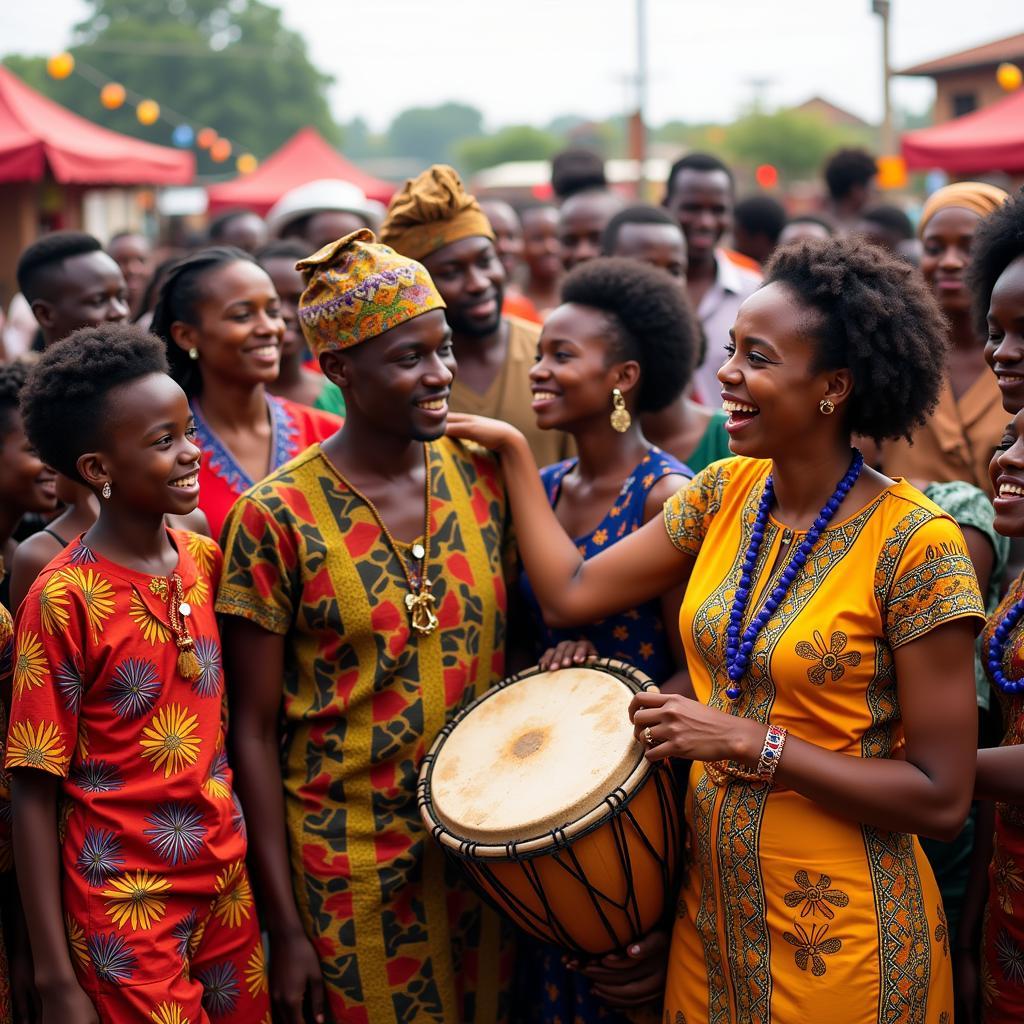African Food and Culture: A Delicious Journey
African Food And Culture are deeply intertwined, offering a vibrant tapestry of flavors, traditions, and stories. From the spicy stews of West Africa to the fragrant tagines of North Africa, the continent’s cuisine is as diverse as its people. This article explores the rich connection between African food and culture, taking you on a culinary adventure that will tantalize your taste buds and broaden your understanding of this fascinating continent.
Exploring the Diversity of African Food and Culture
African cuisine is not a monolithic entity but rather a mosaic of regional specialties, each reflecting the unique environment, history, and cultural practices of its people. In North Africa, the influence of Arab and Mediterranean cultures is evident in dishes like couscous, tagines, and harira soup. Spices like cumin, coriander, and saffron are liberally used, creating aromatic and flavorful meals. Moving south, West African cuisine is characterized by hearty stews, often featuring peanuts, okra, and palm oil. Dishes like jollof rice, fufu, and groundnut soup are staples in many West African countries.
East African food showcases a blend of African, Indian, and Arab influences. Ugali, a thick porridge made from maize flour, is a common accompaniment to stews and grilled meats. In Ethiopia, injera, a spongy sourdough flatbread, serves as both plate and utensil, used to scoop up flavorful lentil stews and vegetable dishes. Southern African cuisine reflects the region’s history of colonization and immigration, with dishes like bobotie (a spiced minced meat dish) and potjiekos (a slow-cooked stew) showcasing Dutch and Malay influences.
What are the Key Ingredients in African Cuisine?
Many African dishes rely on locally sourced ingredients, reflecting the continent’s rich agricultural heritage. Staples like millet, sorghum, and cassava are used to make porridges, breads, and dumplings. Legumes such as beans, lentils, and chickpeas are important sources of protein. A wide variety of fruits and vegetables, including plantains, yams, and leafy greens, add flavor and nutrients to meals. Meat and fish also play a role in many African diets, with dishes often featuring chicken, beef, goat, or fish from local rivers and lakes.
The Cultural Significance of Food in Africa
Food plays a central role in African culture, extending far beyond mere sustenance. Meals are often communal affairs, bringing families and communities together. Sharing food is a sign of hospitality and respect, and special dishes are often prepared for celebrations and ceremonies. In many African cultures, food is also imbued with symbolic meaning. Certain foods may be associated with specific rituals, festivals, or life events. For example, kola nuts are often presented as a gesture of welcome and friendship in West Africa. African hands catch the food. African Journal of Food Agriculture Nutrition and DevelopmentOpen Access provides valuable resources on this topic.
How is Food Prepared in Different African Regions?
Traditional cooking methods vary across the continent, reflecting the availability of resources and cultural practices. In some areas, food is cooked over open fires, while in others, clay ovens or three-stone hearths are used. Steaming, boiling, and frying are common cooking techniques. African food style cuisine urm kenki images can offer a visual glimpse into these diverse culinary traditions. African Journal of Food Agriculture Nutrition and Development AJFAND and African Journal of Food Agriculture Nutrition and Development Abbreviation are also excellent resources for further exploration.
“Food is not just about nourishment in Africa. It’s about sharing, community, and celebrating life.” – Anika Nkosi, Ethnobotanist
“African cuisine is a testament to the continent’s creativity and resilience. It’s a story told through flavors and textures, passed down through generations.” – David Otieno, Culinary Historian
Conclusion: A Taste of Africa
African food and culture offer a rich and rewarding experience for anyone willing to explore its diverse offerings. From the bustling markets to the family kitchens, food is a powerful lens through which to understand the heart and soul of Africa. So, embark on a culinary journey and discover the magic of African food and culture.
FAQ:
- What is the most popular food in Africa? (There’s no single “most popular” dish, as it varies by region).
- Is African food spicy? (Spice levels vary significantly across different regions and dishes.)
- Where can I try authentic African food? (Look for African restaurants in your area or try making some dishes at home.)
- What are some common African spices? (Common spices include cumin, coriander, ginger, and various chili peppers.)
- Are there vegetarian options in African cuisine? (Yes, many African dishes are vegetarian or can be easily adapted.)
- What are some traditional African drinks? (Traditional drinks vary but include hibiscus tea, ginger beer, and palm wine.)
- What is the etiquette for eating in Africa? (Etiquette varies by culture, but sharing and using your hands are common in some regions.)
Need support? Contact us 24/7: Phone: +255768904061, Email: [email protected] or visit us at Mbarali DC Mawindi, Kangaga, Tanzania.

